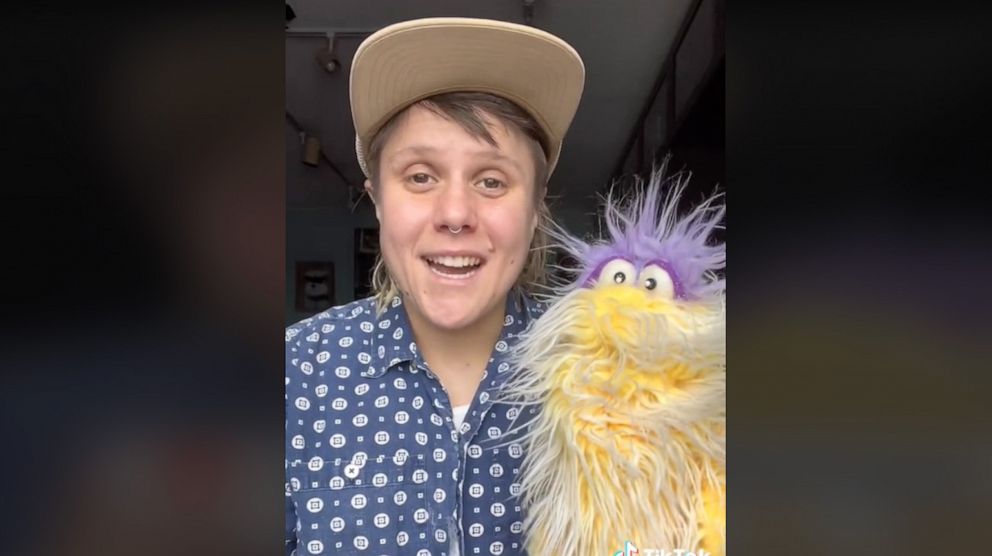Co-star of Ms. Rachel videos for kids responds to backlash over pronoun use
Rachel #Rachel

A star of a popular YouTube show for kids is responding to backlash over their use of they/them pronouns.
The musician, Jules Hoffman, has become a viral star with over 100,000 TikTok followers thanks to their performances alongside Rachel Griffin Accurso, known to her fans as Ms. Rachel, on the YouTube show “Songs for Littles.” Accurso, a teacher, has said she created the show’s format of interactive songs and conversations to help her own son, who had a speech delay.
Jules — as they are known on the series, where they’ve appeared for the past three years — identifies as they/them, according to their TikTok page and their biography on the “Songs for Littles” website.
Hoffman’s use of they/them pronouns came under fire in late February when one TikTok user posted a video with the caption, “When miss Rachel introduces they/them/their pronouns so you have to stop watching her.”
The video from the user, who identifies herself as a “stay-at-home, homeschooling mom,” quickly sparked a debate, generating nearly 5,000 comments.
Some followers replied in agreement, with one writing, “I haven’t really seen it in her videos yet, but if it ever happens my daughter will be finding a new show.”
“Why does no one understand that they are putting this stuff on CHILDREN shows. Let them be kids,” wrote another.
Other watchers of “Songs for Littles” said they support Hoffman and their decision to use they/them pronouns. Many commenters noted they had not seen the topic addressed on the YouTube show, only on Hoffman’s personal TikTok page.

Ms. Rachel and her co-star Jules perform in a video on the YouTube series “Songs for Littles.”
Songs for Littles/YouTube
“We’re not cancelling Ms. Rachel in this Christian household,” wrote one user, who noted there are “no conversations about Jules’ gender identity” on the show.
“My daughter is 2 she doesn’t care about pronouns. She was dancing to Jules singing this morning while watching Ms. Rachel,” wrote another user.
Hoffman told ABC News they saw the video on TikTok earlier this week but waited until Thursday to respond on social media.
“It wasn’t a priority for me to see a video that was negative in nature,” Hoffman said Thursday by email. “It was the way people were supporting me in the comments that made me more grateful than ever to be who I am and doing this work.”
They continued, “Of course hurtful things hurt for a moment, but I had to move into the space of how this could be a teachable moment for the younger generation.”
Hoffman took to TikTok on Thursday to respond to the controversy in a kid-friendly way.
“I didn’t know how to respond to everything that is going on,” Hoffman captioned a video showing them interacting with a puppet. “I want to address the [elephant] in the room in the best way I know how- by teaching kids about love and acceptance.”
In the video, Hoffman starts a conversation with a puppet named Poppy by asking if the puppet has ever heard anyone say anything mean about itself.
When Poppy replies that some people make fun of its voice, Hoffman replies, in part, “Just because a few people don’t like your voice that you know, that doesn’t mean that everybody doesn’t like your voice … Poppy, love is always going to be stronger than hate and I love your voice.”
The conversation around Hoffman’s use of they/them pronouns comes amid a shift of “they” being used more and more as a gender-neutral singular pronoun in recent years as transgender and non-binary people say they are able to live more authentic lives.
Around 4 in 10 Americans say they personally know someone who is transgender, and nearly a quarter of Americans say they know someone who uses gender-neutral pronouns such as “they,” according to 2021 Pew Research Center data.
The word “they” is most often used for someone who identifies as non-binary or genderqueer or gender non-conforming, meaning they experience their gender identity and/or gender expression as falling outside the categories of man or woman. “They” can also be used for those who identify as neither male nor female.
“Using the correct pronouns not only shows that we recognize others for who they are, but it’s also a sign of respect and courtesy,” Carmarion D. Anderson-Harvey, Alabama state director for the Human Rights Campaign, told ABC News previously. “When someone is misgendered, meaning, when another person uses incorrect pronouns or descriptors to refer to them, we’ve found that it can be upsetting, invalidating, hurtful and even a cause of harm.”
With their increased usage, “they” pronouns have become a flashpoint in the divisive culture wars playing out across the country, particularly in schools.
Last month, students in Virginia Beach, Virginia, protested a proposed policy that would ban transgender students from using the bathroom that aligns with their gender identity and would require parents to approve name or pronoun changes. And in Kentucky, the state senate last month passed a bill allowing teachers to refuse to refer to transgender students by their preferred pronouns.
Hoffman said they hope their presence on “Songs for Littles” and on their own personal TikTok page shows kids they will be “supported and loved” just by being their “truest selves.”

Jules, a costar on the show “Songs for Littles,” is seen in a TikTok video posted on March 2, 2023.
@Julessingsforlittles/TikTok
“I am hoping that by being me, I am able to show kids that there are different types of people in the world, and sometimes people like me don’t always fit in to the boxes that society has imposed upon us,” Hoffman told ABC News. “I want kids and adults alike to know that they will be supported and loved when they are their most authentic and truest selves.”
Accurso, whose YouTube channel has over 3 million subscribers, has not commented on the reaction online to Hoffman’s use of they/them pronouns.
Earlier this week, she shared on TikTok that she is pausing posting on the social media platform to help protect her mental health. She has continued to interact with her followers on Instagram.
“Hurtful videos and comments, no matter how much attention they get, will not bring you what you want. Only love can do that,” Accurso wrote on TikTok alongside a video of her singing, “I’m taking a break from TikTok for my mental health.”
Accurso told ABC News in a statement Wednesday that she hopes to return to TikTok “soon.”
“I think it’s important to recognize when we need a break from social media and to set social media boundaries,” she said in a statement. “I love connecting with the wonderful parenting & caregiving community on TikTok and will be back soon!”